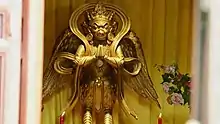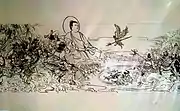Golden Winged Great Peng
The Golden Winged Great Peng (Chinese: 金翅大鵬雕), originally known as Dapeng Jinchi Mingwang (Chinese: 大鵬金翅明王; lit. 'Golden-Winged King of Illumination'), is a Buddhist bird deity in the Chinese religion and Mahayana Buddhism.[1] He is the spiritual uncle of the Buddha and gave him a high position on heaven as a guardian deity of the Vulture Peak.[2][3] His origins are said to derive from an Indian bird god Garuda. Peng is one of the 8 demi-gods of Buddhism (Tian Long Ba Bu) and helps to guard Mount Sumeru and Trāyastriṃśa from being attacked by the Asuras.[1]
| Golden Winged Great Peng | |||||||
|---|---|---|---|---|---|---|---|
 Golden Winged Great Peng statue | |||||||
| Traditional Chinese | 金翅大鵬雕 | ||||||
| Simplified Chinese | 金翅大鹏雕 | ||||||
| |||||||
Peng is appearances in Chinese ancient literature Journey to the West (西游記), General Yue Fei (Shuo Yue quan zhuan, 說岳全傳) and also mentioned in some Chinese buddhism literature.[4][5][6][7]
Legends

According to legend, during the primordial times, the original Phoenix (Fenghuang), the leader of flying beings, gave birth to the peacock Mahamayuri and the eagle Golden Winged Great Peng. The peacock once consumed the Buddha, who however managed to escape via cut her stomach. The Buddha intended to kill the peacock, however the deities told him to stop, thus the Buddha promoted her to be his godmother, therefore the eagle would be his uncle and gave the eagle a high position on heaven.[8][7]
Peng sits at the head of the Buddha's throne in the Western Paradise. His fiery temper is aroused when a bat-spirit (the embodiment of the Aquarius constellation) passes gas during the Enlightened One's sermon on the Lotus Sutra. He swoops down from the throne and snatches her up in his beak, killing her instantly. The Buddha admonishes the bird for his transgression of Buddhist law and exiles him to earth. His rebirth in the human world actually serves to counterbalance the actions of a nomadic antagonist.[9]
Journey to the West

Peng is an antagonist of the 16th-century Chinese classic novel Journey to the West. He is a demonic eagle who was born from the primordial Phoenix. The Buddha gave the Eagle a high position on Heaven and unfortunately only serves to fuel his big ego. For unknown reason, the Eagle transformed himself into a humanoid form, the Golden Winged Great Peng, ate all the residents of the Lion Camel Kingdom, ruled it for 500 years, and befriend the Azure Lion Demon and the Yellow Toothed Elephant Demon to eat Tang Sanzang. His powers and position of being technically the uncle of the Buddha fuels his big ego as he considers himself above everyone else. He is armed with a ji and capable of flying over great distances. He possesses a Flask of Yin and Yang Essence (陰陽二氣瓶) which can suck in unsuspecting victims.[8]
Peng set up several plans to capture Tang Sanzang and his companions and even successfully captured Sun Wukong himself. After numerous humiliating failures under the hand of the three demon kings, Wukong met the Buddha for help and learned about the backstory of Peng. After a battle between Wukong and the three demons, both the Lion and the Elephant are forced to revert to their original forms, and the Buddha shows up to subdue Peng and take him back to Vulture Peak.
After his defeat at the hand of the Buddha, Peng admits that he enjoys his life as a demon and eating humans, though after listening to the Buddha, Peng has no choice but abandoned his evil goals and redeemed himself in the process. After some struggle, the bird agrees to become a protector of Buddhist law. Much later, when Sanzang and his companion received the scriptures, the Buddha, knew that those are the scriptures with no text, orders the Eagle to chase them and took the fake scriptures. The Eagle did this right away. Thus, Chinese fiction portrays Peng as a powerful demon king that submits to the Buddha and perches above his throne as a hot-tempered guardian deity.[10]
Shurangama Mantra
The Shurangama Mantra is a dhāraṇī or long mantra of Buddhist practice in China, Japan and Korea. The 302nd line of the mantra is pertains to the great golden-winged peng bird, the garuda, and its retinue. Its retinue includes all species of birds. They are all governed by the great golden-winged peng bird, who is the king among birds. The peng bird feasts exclusively on dragons. His wing-span measures an astounding 330 yojanas. When he flaps his wings, the waters of the sea part clear to the deepest seabed.[11]
Overview
A literary motif appearing in Journey to the West and The Story of Yue Fei depicts the bird deity Peng as a demon-turned-Buddhist guardian who sits above the Buddha's throne.[6]
The Ming dynasty examples suggest Peng was considered a common element of the Buddha's enlightenment torana. The bird god is in effect a guardian of the faith who watches over the world from an exalted position high atop the Buddha's throne.[6]
References
- "The Great Golden-Winged Peng Bird". www.gbm-online.com.
- "西遊中,金翅大鵬雕為何寧願落草為妖,也不願受靈山萬佛朝拜?". 熱點資訊 (in Chinese). 7 August 2018.
- Hua, Hsüan (2003). Flower Adornment Sutra (a Commentary by Hsuan Hua): Based on the Tang Dynasty Chinese Translation by Tripitaka Master Siksananda of Khotan. Buddhist Text Translation Society. ISBN 9780881398557.
- Shih (釋妙蓮), Miao Lien (2019). The Arhat and The Fragrant Elephant - Buddhist Stories Vol 4. Lingyen Mountain Temple (Canada).
- 浙江民間故事集 (in Chinese). 遠流出版. 1989. ISBN 9789573200604.
- 孔雀明王行法: 摧伏毒害煩惱 (in Chinese). Buddhall Cultural / 全佛. 2008. ISBN 9789866936333.
- "西遊最強姐弟,為何最後卻反目成仇,只因分別效忠兩位佛祖". 雪花新聞 (in Chinese). 9 March 2019.
- "西遊記中除了金翅大鵬,如來的親戚都是誰?|Zi 字媒體". Zi 字媒體 (in Chinese). 4 September 2017.
- "同是大鵬金翅鳥轉世,岳飛蒙冤而死,他富貴一生". 每日頭條 (in Chinese). 1 June 2017.
- "秒擒孫悟空遭如來佛祖收伏,大鵬金翅雕最後去哪裡了?命運如何?". 每日頭條 (in Chinese). 18 December 2017.
- Vajra Bodhi Sea. Sino-American Buddhist Association. 2005. p. 10.